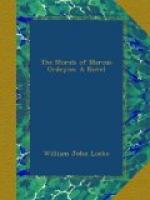CHAPTER XXII
I answered Judith’s letter. After the long silence it seemed, at first, strange to write to her; but soon I found myself opening my heart as I had never done before to man or woman. The fact that, accident aside, we were never to meet again, drew the spiritual elements in us nearer together, and the tone of her letter loosened the bonds of my natural reserve. I told her of my past year of life, of the locked memorial chamber upstairs, of the madness through which I had passed, of my weary pursuit of the Theory, and of my attitude towards her solution of the problem. Having written the letter I felt comforted, knowing that Judith would understand.
I finished it about six o’clock one afternoon, and shrinking from giving it to Stenson to post, as it was the first private letter I had written since my arrival in London, I took it myself to the pillar-box. The fresh air reproached me for the unreasonable indoor life I had been leading, and invited me to remain outside. It was already dark. An early touch of frost in the November air rendered it exhilarating. I walked along the decorous, residential roads of St. John’s Wood feeling less remote from my kind, more in sympathy with the humdrum dramas in progress behind the rows of lighted windows. Now and then a garden gate opened and a man in evening dress, and a woman, a vague, dainty mass of satin and frills and fur, emerged, stood for a moment in the shaft of light cast by the open hall-door beyond, which framed the white-capped and aproned parlour-maid, and entering a waiting hansom, drove off into the darkness whither my speculative fancy followed them. Now and then silhouettes appeared upon the window-blinds, especially on the upper floors, for it was the dressing hour and the cares of the day were being thrown aside with the workaday garments. In one house, standing far back from the road, the drawing-room curtains had not been drawn. As I passed, I saw a man tossing up a delighted child in his arms, and the mother standing by. Ay de mi! A commonplace of ten thousand homes, when the man returns from his toil. Yet it moved me. To earn one’s bread; to perpetuate one’s species; to create duties and responsibilities; to meet them like a brave man; to put the new generation upon the right path; to look back upon it all and say, “I have fulfilled my functions,” and pass forth quietly into the eternal laboratory—is not that Life in its truth and its essence? And the reward? The commonplace. The welcome of wife and children—and the tossing of a crowing babe in one’s arms. And I had missed it all, lived outside it all. I had spoken blasphemously in my besotted ignorance of these sacred common things, and verily I had my recompense in a desolate home and a life of about as much use to humanity as that of St. Simeon Stylites on top of his pillar.
So I walked along the streets on the track of the wisdom which Judith had revealed to me, and I seemed to be on the point of reaching it when I arrived at my own door.




